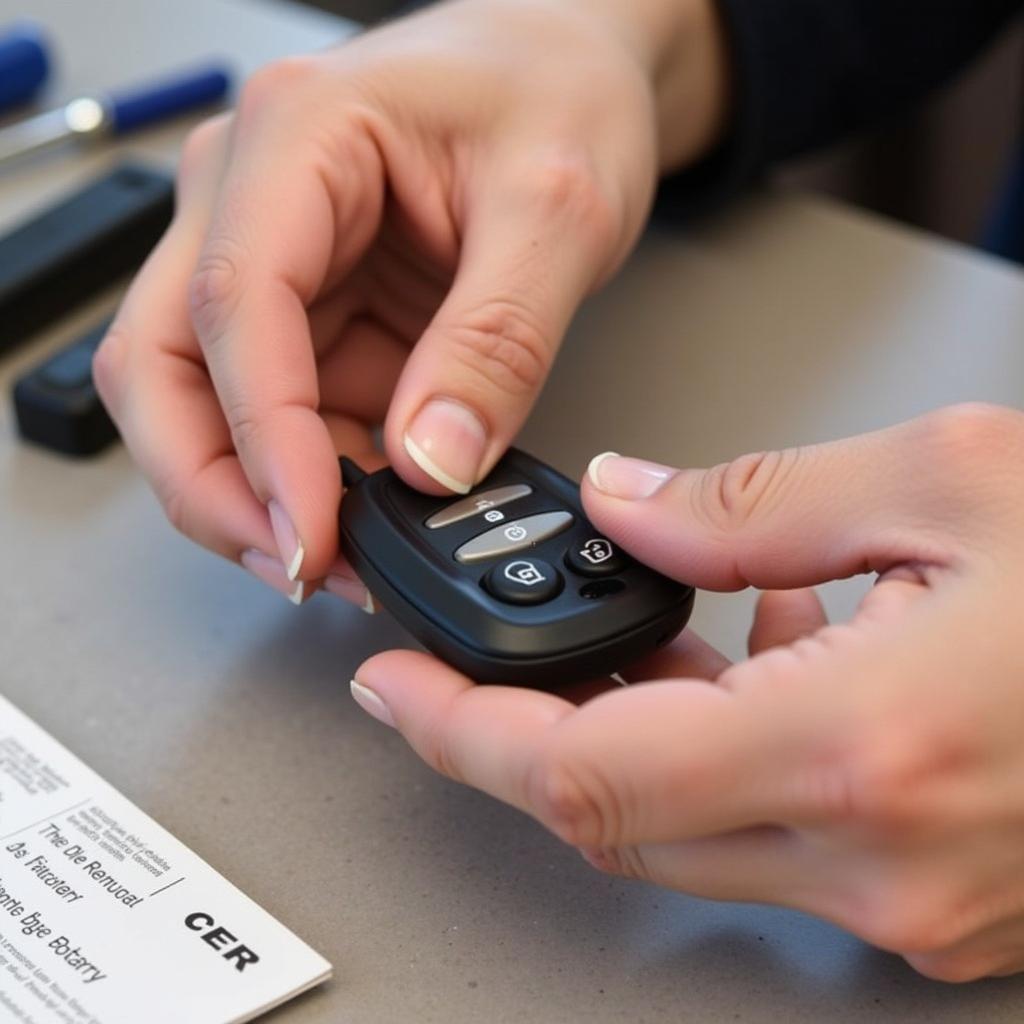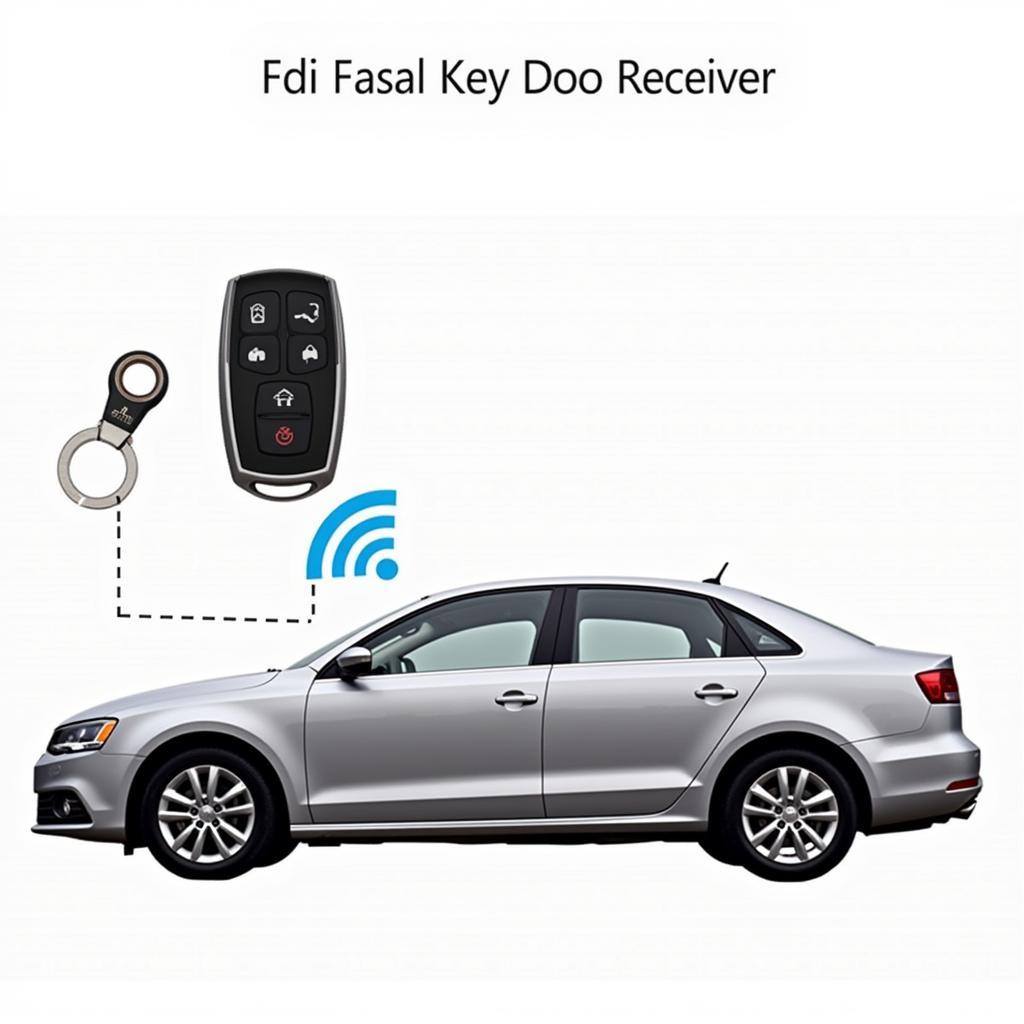You walk up to your car, key fob in hand, ready to head out. You press the unlock button… and nothing happens. We’ve all been there – that moment of panic when your key fob seems to have suddenly stopped talking to your car. But don’t worry, there’s usually a simple explanation (and fix!).
This comprehensive guide will walk you through the most common reasons your key fob might not be unlocking your car and provide you with practical solutions to get you back on the road quickly.
Common Culprits: Why Your Key Fob Might Be Failing
There are several reasons why your key fob might be experiencing difficulties. Let’s delve into the most frequent ones:
1. Dead Key Fob Battery: The Usual Suspect
The most common culprit behind a malfunctioning key fob is a dead battery. Like any battery-powered device, key fobs have a limited lifespan. Over time, the battery drains, and eventually, it needs replacing.
Signs Your Key Fob Battery is Dying:
- Decreased Range: You might notice that you need to be much closer to your car for the key fob to work.
- Intermittent Functionality: The key fob might work sometimes and not others, leading to a frustrating game of “try again.”
- No Response at All: In extreme cases, the key fob might stop working altogether.
If you suspect a dead battery, the solution is usually straightforward. You can find instructions on how to replace the battery in your car’s owner’s manual or by searching online for guides like how to replace battery in 2016 toyota camry key fob.
 Replacing a Car Key Fob Battery
Replacing a Car Key Fob Battery
2. Key Fob Programming Issues: Out of Sync
Sometimes, the problem isn’t the battery itself but rather a communication breakdown between your key fob and your car. This can happen if the key fob’s programming becomes corrupted or if your car’s system experiences a glitch.
Possible Causes of Programming Errors:
- Physical Damage: A dropped key fob can sometimes cause internal damage that affects its programming.
- Battery Replacement: In rare instances, replacing the battery yourself can sometimes disrupt the programming.
- Electrical Issues: Electrical problems in your car can interfere with the key fob’s signal.
Reprogramming a key fob often requires special equipment and knowledge, so it’s best to consult your dealership or a qualified automotive locksmith. However, some car models allow you to reprogram the key fob yourself. You can find model-specific instructions in your owner’s manual or through online resources.
3. Key Fob Signal Interference: Blocked Communication
Key fobs use radio waves to communicate with your car. However, these signals can be interfered with by other electronic devices or even environmental factors.
Common Sources of Key Fob Signal Interference:
- Electronic Devices: Mobile phones, laptops, Bluetooth devices, and even other key fobs can interfere with your car key’s signal.
- Physical Obstacles: Large metal objects, buildings, or being parked too close to a radio tower can block the signal.
- Electromagnetic Fields: High-voltage power lines or security systems can create electromagnetic fields that disrupt key fob signals.
If you suspect signal interference, try moving away from any potential sources of interference. You can also try shielding your key fob with your hand or placing it closer to the car’s receiver, which is usually located near the driver’s side door handle.
4. Faulty Car Battery: The Power Source Problem
While it might seem counterintuitive, a dead car battery can also prevent your key fob from unlocking your car. Even though your key fob has its own battery, it needs power from your car’s battery to complete the unlocking process.
Signs Your Car Battery Might Be Dead:
- Slow Engine Crank: When you try to start your car, the engine cranks slowly or not at all.
- Dimming Lights: Your headlights and interior lights may be dimmer than usual.
- Warning Lights: The battery warning light on your dashboard may be illuminated.
If you think your car battery is the problem, you’ll need to jump-start your car or replace the battery.
5. Malfunctioning Car Receiver: A Broken Link
In some cases, the problem might not be with your key fob at all but with your car’s receiver. This receiver is responsible for picking up the signal from your key fob and unlocking the doors.
Potential Causes of Receiver Issues:
- Water Damage: If water gets into the receiver, it can cause it to short-circuit or malfunction.
- Electrical Problems: Faulty wiring or a blown fuse can disrupt the receiver’s operation.
- Physical Damage: A collision or impact near the receiver’s location can damage it.
Diagnosing and fixing a faulty receiver typically requires professional expertise.
Beyond the Basics: Less Common Key Fob Issues
While the above reasons cover the majority of key fob troubles, here are a few less common but still possible culprits:
- Worn-Out Key Fob Buttons: If you frequently use your key fob, the buttons can wear out over time, leading to poor contact.
- Internal Key Fob Damage: A drop or impact can cause unseen internal damage to the key fob’s circuitry.
- Antenna Problems: In rare cases, a problem with your car’s antenna or the antenna inside the key fob can interfere with signal transmission.
- Immobilizer System Malfunction: Modern cars have immobilizer systems that prevent theft. If this system malfunctions, it can prevent your key fob from working correctly.
“When troubleshooting key fob issues, it’s crucial to eliminate the most common causes first,” advises John Smith, Senior Automotive Technician at CarDiag Tech Workshop. “Start with checking the key fob battery and ensuring there’s no signal interference. If the problem persists, it’s best to consult a qualified professional.”
 Car Key Fob and Receiver Location
Car Key Fob and Receiver Location
Preventing Future Key Fob Frustrations
While some key fob issues are unavoidable, there are steps you can take to minimize the chances of encountering these problems:
- Regular Battery Replacement: Replace your key fob battery every 2-3 years as a preventative measure.
- Handle Your Key Fob with Care: Avoid dropping it or exposing it to extreme temperatures.
- Keep Your Key Fob Away from Moisture: Water and electronics don’t mix. Try to keep your key fob dry.
- Store Your Key Fob Properly: Store it in a safe place, away from other electronic devices that could interfere with its signal.
Key Fob Troubleshooting: Next Steps
If you’ve tried the basic troubleshooting tips and are still unable to unlock your car with your key fob, it’s best to seek professional assistance. A qualified automotive locksmith or your dealership can diagnose the problem accurately and provide the necessary repairs or replacements.
FAQs
Q: Can I drive my car if the key fob battery is dead?
A: Yes, you can usually start your car even with a dead key fob battery. Most cars have a backup system, such as a hidden key slot or a passive keyless entry system, that allows you to start the car without using the key fob’s remote functions.
Q: How much does it cost to replace a key fob battery?
A: The cost of a key fob battery varies depending on the make and model of your car. However, you can typically purchase a replacement battery for a few dollars at most auto parts stores or online retailers.
Q: How do I know if my key fob needs to be reprogrammed?
A: If your key fob is not responding at all or if it’s only working intermittently after replacing the battery, it might need to be reprogrammed. Other signs include the car horn not beeping when you press the lock/unlock buttons or the car’s alarm system not activating.
Explore More Key Fob Resources
- How to roll down windows with key fob vw
- How to turn on nissan altima with key fob
- How to change key fob battery mazda cx 5
- How to change battery in key fob subaru outback
If you need expert assistance with your Key Fob or any car diagnostic issue, contact us today!
WhatsApp: +1(641)206-8880
Email: [email protected]
Our dedicated customer support team is available 24/7 to answer your questions and schedule appointments.

Leave a Reply